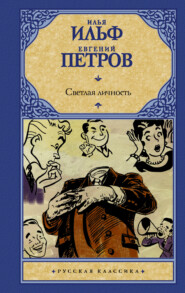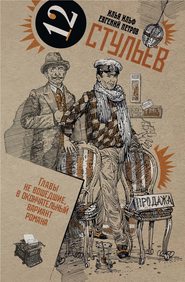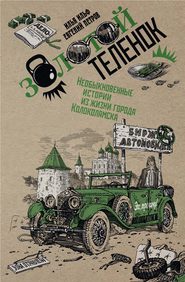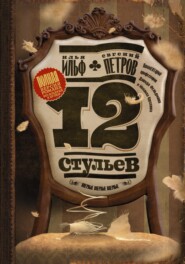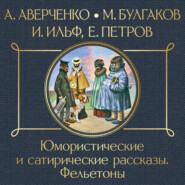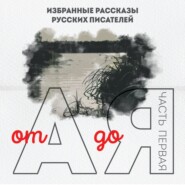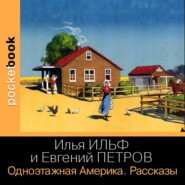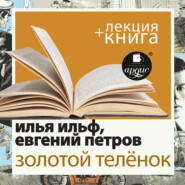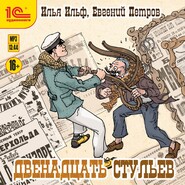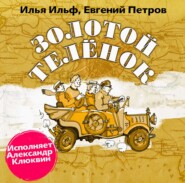По всем вопросам обращайтесь на: info@litportal.ru
(©) 2003-2024.
✖
Одноэтажная Америка / Little Golden America
Автор
Жанр
Серия
Год написания книги
1937
Теги
Настройки чтения
Размер шрифта
Высота строк
Поля
did not like to make money.
The last point was obligatory, because we did not have much money. We lacked it to such an extent that, to tell the truth, we had very little of it.
Thus, as a matter of fact, we needed an ideal creature, a rose without thorns, an angel without wings. We needed a complex hybrid: a guide-chauffeur-interpreter-altruist. Michurin himself would have given up. It would have taken scores of years to breed this hybrid.
There was no sense in buying an automobile until we found the appropriate hybrid, yet the longer we stayed in New York the less money we had left for an automobile. We solved this complex problem daily, and yet we could not solve it. Besides, there was almost no time for thinking about it.
On the way to America we did not take into consideration one thing: hospitality, American hospitality. It is limitless and far outstrips everything possible or conceivable of its kind, including Russian, Siberian, and Georgianhospitality. The first American you meet will not fail to invite you to his house or to a restaurant to drink a cocktail with him. At each cocktail party you will find ten friends of your new acquaintance. Each one of them will not fail to invite you to a cocktail party of his own, and each one of these will have ten or fifteen friends. in two days you suddenly acquire a hundred new acquaintances, and within a week several thousand. It is simply dangerous to spend a year in America, because you will be a confirmed drunkard and a kind of Gleb Uspensky tramp.
All the several thousands of our new friends were filled with one desire: to show us everything that we would want to see, to go with us wherever we’d like to go, to explain everything to us that we did not understand. Remarkable people are these Americans. It is pleasant to be friends with them, and it is easy to do business with them.
We were almost never alone. The telephone of our hotel began to ring in the morning, and it rang as regularly as that in an information bureau. In the rare and brief intervals between meetings with necessary and interesting people we dreamed of this ideal creature still out of our reach. Even our amusements were most businesslike, spurred on by such advice as:
“You must see it; otherwise, you will never know America!”
“What? You haven’t been in a burlesque? Well, but then you haven’t seen America! Why, that is the most vulgar spectacle in the world! You can see it only in America!”
“What? You haven’t been to the automobile races? Excuse me, but you don’t know what America is!”
It was on a bright October morning that we made our way by automobile out of New York to an agricultural exhibit in the little town of Danbury, in the state of Connecticut.
We will say nothing here about the roads on which we travelled. That would take time, inspiration, a special chapter.
The red autumnal landscape stretched on both sides of the road. The leafage was red-hot, and when it. seemed that nothing in the world could be redder there appeared another grove of maddeningly Indian colour. That was not the design of the forest around Moscow, to which our eyes were accustomed, where you will find red and bright yellow and soft brown. Here everything flamed as in a sunset, and this amazing conflagration around New York, this Indian sylvan gorgeousness, continued all through October.
A roar and a clatter was heard as we approached Danbury. The flock of automobiles rested on the slopes of a little valley that was still green. There the exhibit was laid out. Policemen stretched out their arms forbiddingly, chasing us from one place to another. We finally found a place for the automobile and went to the stadium.
At the round tribune the roar was heart-rending, and over the high walls of the stadium flew small stones and hot sand, thrown up by machines around the sharp turn. It would have been easy to lose an eye or a tooth. We hastened our footsteps, shielded ourselves with our arms, just as the Pompeians must have done when their native city was perishing in a volcanic eruption.
We had to wait in a small queue to buy tickets. Around us was the clatter of a drab, provincial fair. The vendors, who have been described more than once by O. Henry, loudly praised their wares: strange aluminium whistles, carved swagger sticks, sticks crowned with dolls, all the trash found at a fair. A cow with beautiful eyes and long eyelashes was being led away. The beauty swung her udder enticingly. The owner of the mechanical organ danced to the tune of the deafening music of his contraption. A swing in the shape of a boat attached to a green metallic rigging made a complete circle. When those who were swinging were high in the sky, their heads down, the pure-hearted and hysterical feminine scream that broke forth carried us at once from the state of Connecticut to the state of Moscow, to the Park of Culture and Rest. The vendors of salted nuts and cheese-cracker sandwiches yelled at the top of their voices.
An automobile race is an empty spectacle, dreary and morbid. Red, white, and yellow racing machines with straddling wheels and numbers painted on the sides, shooting out like rocket volleys, flew past us. One round was succeeded by the next. Five, six, sometimes ten,machines competed at the same time. The audience roared. It was frightfully boring. The only thing that could possibly amuse the public would be an automobile accident. As a matter of fact, that is what people came here for. At last it occurred. Suddenly, alarm signals were heard. Everyone jumped from his seat. One of the automobiles flew off the track while going full-speed. We were still pushing our way through the crowd which surrounded the stadium when we heard the frightful baying of the ambulance. Through its window-panes we managed to see the injured driver. He no longer wore his leather helmet. He sat there, holding on to his blue skull with both hands. He had an angry look. He had lost the prize for which he had risked his life.
In the intervals between heats, on a wooden platform inside the circle, circus comedians were playing a scene which portrayed four clumsy fellows building a house. Naturally, bricks fell on the four fools. They smeared each other with the cement mixture. They beat each other with hammers by mistake, and in sheer self-forgetfulness sawed off their own legs. All this concoction of tricks, which had its origin in the distant antiquity of Greece and Rome and is still brilliantly carried on by such great master clowns as Fratellini, was excellently done by the clowns of the Danbury fair. It is always pleasant to watch good circus work, and its ways, polished through ages, are never boresome.
The fair came to an end. The visitors in the wooden pavilions were few in number. On long tables in the pavilions lay large lacquered vegetables that seemed inedible. The orchestras performed farewell marches, and all the visitors en masse, raising clouds of dust over the clean dark yellow sand, made their way to their automobiles. Here were demonstrated (and sold, of course) trailers for automobiles.
Pairs of Americans, in most cases composed of man and wife, would go inside and exclaim for a long time, impressed by the trailers. They examined the enticing inside of the trailer, the comfortable beds, the lace curtains on the windows, the couch, the convenient and simple metal stove. What could be better? You attach a trailer like that to an automobile, drive out of the thundering city, and drive and drive to wherever your eyes may lead you. That is, you know where you are driving. The eyes “look into the forest,” and they see the Great Lakes, the beaches of the Pacific Ocean, the canyons, and the broad rivers.
Groaning, man and wife would crawl out of a trailer. It was too expensive. Here in Danbury were trailers at $350 and some at $700. But where can you get $700? Where can you get the time for a long trip?
The long columns of machines flew soundlessly back to New York, and after an hour and a half at a good clip we saw the flaming sky. Skyscrapers shone from top to bottom. Over the earth gleamed the flowing lights of the cinemas and the theatres?
Carried away by the storm of life, we decided to devote the evening to acquaintanceship with entertainment for common people.
A “nickel” is what Americans call a small nickel coin of five cents. With all its appearance nocturnal New York tells the pleasure-seeker:
“Give me your nickel! Drop your nickel! Part with your nickel and you will be happy!”
The clicking noise comes out of the large amusement stores. Here stand scores of pinball tables of all kinds. You drop a nickel in the proper slot; automatically a cue is liberated by a spring, and the pleasure-seeker, having decided to spend the evening in revelry, can shoot a steel ball five times. For a certain number of points won he receives a card-board certificate from the master of the establishment. A half-year spent at regular play and, in consequence of the regular dropping of nickels, the reveller has the necessary number of points to receive his prize – one of those beautiful prizes that stand on the shelf. That may be a glass vase or an aluminium cocktail-shaker, or a table clock, or a cheap fountain pen or safety razor. In brief, here are all the treasures at the mere sight of which the heart of a housewife, a child, or a gangster contracts with sweetness. Americans spend hours in such lonely entertainment, in a concentrated, indifferent manner, without anger and without exultation.
Having finished with the pinball, one may go to an automatic soothsayer. She sits in a glass case, yellow-faced and thin. Before her in semicircle lies cards. It is taken for granted that you must drop a nickel. Then the soothsayer comes to life. Her head begins to bob, her chest to heave, and a wax arm glides over the cards. This is no spectacle for impressionable people. It is all so stupid and so horrible that one is in danger of losing one’s mind. A half-minute later the fortune-teller freezes into her previous position. Now you must pull a handle. From the crack falls the prophecy of your fate. It is in most cases a portrait of your future wife and a short description of her attributes.
The stores of these idiotic wonders are disgusting even when they are located in the centre of a city full of tinsel and noise. But somewhere on the East Side, in the dark alleys, where the sidewalks and pavements are littered with the refuse of the daytime trade, among signboards which testify to the extreme poverty (here you can get a shave for five cents, lodging for fifteen), such a store, dimly lighted, dirty, where two or three figures silently and joylessly click at pinball, where by comparison an ordinary game of billiards becomes a genuine triumph of culture and intellect – there it is mortal boredom.
The head can ache from work. But it can also ache from amusement.
After the amusement stores we found ourselves in another strange amusement establishment.
The clatter of jazz imitates so far as possible the clatter of the elevated railway. People crowd around a glass booth in which sits a live cashier girl with a set, waxy smile on her face. This is a theatre called “Burlesque”. This is a variety show for thirty-five cents.
The hall was full, and the young, determined ushers placed people anywhere at all. Some did not find seats. They stood in the aisles without taking their eyes off the stage.
On the stage a woman sang. She did not know how to sing. She bad the kind of voice that did not entitle her to hold forth even at birthday parties for the most indulgent relatives. She also danced. One did not have to be a balletomane to realize that this person would never become a ballerina. Yet the public smiled approvingly. Apparently in this audience there were no fanatics of singing and no balletomanes. The audience had come here for something else.
The “something else” was explained when this singer of songs and dancer of dances suddenly began to tittup across the stage, casting off her clothes as she cut her capers. She cast them off quite slowly so that the audience might examine this artistic mise en scene in all its detail. Suddenly the jazz cackled, the music stopped, and with a bedroom scream the girl ran into the wings. The young men who filled the hall applauded enthusiastically. A master of ceremonies, a man of athletic appearance dressed in a dinner jacket, came out on the stage and made a businesslike proposition:
“If you applaud harder she will take off something else.”
Such an explosion of applause broke loose then as even Mattia Battistini or Anna Pavlova or Keane himself, the greatest of the great, could never expect in a lifetime from any audience. No! Mere talent cannot win such a public!
The performer again passed across the stage, sacrificing what little was left of her garments. To satisfy the theatre censorship, she held a bit of clothing before her with one hand.
After the first dancer and singer another came out and repeated exactly what her predecessor had done. The third one did what the second had done. The fourth, fifth, and sixth did not make any new contributions. They sang without voice and without ear, and they danced with the grace of a kangaroo. But they disrobed. The other ten girls took their turns in faithfully repeating the same performance.
The only difference between them was that some were brunettes (these were fewer in number), while others were light-haired lambs (there were more of these).
This Zulu solemnity continued for several hours. It is pornography mechanized to such an extent that it acquires a kind of industrial and factory character. There is as little eroticism in this spectacle as in a serial production of vacuum cleaners or adding machines.
A small soundless rain fell on the street. But had there been a storm with thunder and lightning it would not have been heard.
New York itself thunders and gleams much more thoroughly than any storm. It is an excruciating city. It constantly rivets all attention to itself. It makes your eyes ache.
Yet it is impossible not to look upon it.
6. Papa and Mamma
BEFORE DEPartING from Moscow we had collected numerous letters of introduction. It was explained to us that America was the land of letters of introduction. Without them you could not turn around.
Americans of our acquaintance whom we visited before departure at once and in silence sat down at their typewriters and began to pound out:
“Dear Sir: My friends, whom I commend to your attention…”
And so on and so forth. “Regards to your wife”—and in brief all that is proper to write on such occasions. They knew beforehand what we had come for.
The correspondent of the New York Times, Walter Duranty, wrote with incredible speed, taking the cigarette out of his mouth only in order to swallow some Crimean Madeira. We carried away from him a dozen letters. In farewell he told us:
“Go, go to America! It is much more interesting there now than here in your Russia. With you everything goes up.” He indicated with his hand the rising steps of a stairway. “With you here everything is clear. But with us everything is not yet clear. And no one knows what may happen.”
The last point was obligatory, because we did not have much money. We lacked it to such an extent that, to tell the truth, we had very little of it.
Thus, as a matter of fact, we needed an ideal creature, a rose without thorns, an angel without wings. We needed a complex hybrid: a guide-chauffeur-interpreter-altruist. Michurin himself would have given up. It would have taken scores of years to breed this hybrid.
There was no sense in buying an automobile until we found the appropriate hybrid, yet the longer we stayed in New York the less money we had left for an automobile. We solved this complex problem daily, and yet we could not solve it. Besides, there was almost no time for thinking about it.
On the way to America we did not take into consideration one thing: hospitality, American hospitality. It is limitless and far outstrips everything possible or conceivable of its kind, including Russian, Siberian, and Georgianhospitality. The first American you meet will not fail to invite you to his house or to a restaurant to drink a cocktail with him. At each cocktail party you will find ten friends of your new acquaintance. Each one of them will not fail to invite you to a cocktail party of his own, and each one of these will have ten or fifteen friends. in two days you suddenly acquire a hundred new acquaintances, and within a week several thousand. It is simply dangerous to spend a year in America, because you will be a confirmed drunkard and a kind of Gleb Uspensky tramp.
All the several thousands of our new friends were filled with one desire: to show us everything that we would want to see, to go with us wherever we’d like to go, to explain everything to us that we did not understand. Remarkable people are these Americans. It is pleasant to be friends with them, and it is easy to do business with them.
We were almost never alone. The telephone of our hotel began to ring in the morning, and it rang as regularly as that in an information bureau. In the rare and brief intervals between meetings with necessary and interesting people we dreamed of this ideal creature still out of our reach. Even our amusements were most businesslike, spurred on by such advice as:
“You must see it; otherwise, you will never know America!”
“What? You haven’t been in a burlesque? Well, but then you haven’t seen America! Why, that is the most vulgar spectacle in the world! You can see it only in America!”
“What? You haven’t been to the automobile races? Excuse me, but you don’t know what America is!”
It was on a bright October morning that we made our way by automobile out of New York to an agricultural exhibit in the little town of Danbury, in the state of Connecticut.
We will say nothing here about the roads on which we travelled. That would take time, inspiration, a special chapter.
The red autumnal landscape stretched on both sides of the road. The leafage was red-hot, and when it. seemed that nothing in the world could be redder there appeared another grove of maddeningly Indian colour. That was not the design of the forest around Moscow, to which our eyes were accustomed, where you will find red and bright yellow and soft brown. Here everything flamed as in a sunset, and this amazing conflagration around New York, this Indian sylvan gorgeousness, continued all through October.
A roar and a clatter was heard as we approached Danbury. The flock of automobiles rested on the slopes of a little valley that was still green. There the exhibit was laid out. Policemen stretched out their arms forbiddingly, chasing us from one place to another. We finally found a place for the automobile and went to the stadium.
At the round tribune the roar was heart-rending, and over the high walls of the stadium flew small stones and hot sand, thrown up by machines around the sharp turn. It would have been easy to lose an eye or a tooth. We hastened our footsteps, shielded ourselves with our arms, just as the Pompeians must have done when their native city was perishing in a volcanic eruption.
We had to wait in a small queue to buy tickets. Around us was the clatter of a drab, provincial fair. The vendors, who have been described more than once by O. Henry, loudly praised their wares: strange aluminium whistles, carved swagger sticks, sticks crowned with dolls, all the trash found at a fair. A cow with beautiful eyes and long eyelashes was being led away. The beauty swung her udder enticingly. The owner of the mechanical organ danced to the tune of the deafening music of his contraption. A swing in the shape of a boat attached to a green metallic rigging made a complete circle. When those who were swinging were high in the sky, their heads down, the pure-hearted and hysterical feminine scream that broke forth carried us at once from the state of Connecticut to the state of Moscow, to the Park of Culture and Rest. The vendors of salted nuts and cheese-cracker sandwiches yelled at the top of their voices.
An automobile race is an empty spectacle, dreary and morbid. Red, white, and yellow racing machines with straddling wheels and numbers painted on the sides, shooting out like rocket volleys, flew past us. One round was succeeded by the next. Five, six, sometimes ten,machines competed at the same time. The audience roared. It was frightfully boring. The only thing that could possibly amuse the public would be an automobile accident. As a matter of fact, that is what people came here for. At last it occurred. Suddenly, alarm signals were heard. Everyone jumped from his seat. One of the automobiles flew off the track while going full-speed. We were still pushing our way through the crowd which surrounded the stadium when we heard the frightful baying of the ambulance. Through its window-panes we managed to see the injured driver. He no longer wore his leather helmet. He sat there, holding on to his blue skull with both hands. He had an angry look. He had lost the prize for which he had risked his life.
In the intervals between heats, on a wooden platform inside the circle, circus comedians were playing a scene which portrayed four clumsy fellows building a house. Naturally, bricks fell on the four fools. They smeared each other with the cement mixture. They beat each other with hammers by mistake, and in sheer self-forgetfulness sawed off their own legs. All this concoction of tricks, which had its origin in the distant antiquity of Greece and Rome and is still brilliantly carried on by such great master clowns as Fratellini, was excellently done by the clowns of the Danbury fair. It is always pleasant to watch good circus work, and its ways, polished through ages, are never boresome.
The fair came to an end. The visitors in the wooden pavilions were few in number. On long tables in the pavilions lay large lacquered vegetables that seemed inedible. The orchestras performed farewell marches, and all the visitors en masse, raising clouds of dust over the clean dark yellow sand, made their way to their automobiles. Here were demonstrated (and sold, of course) trailers for automobiles.
Pairs of Americans, in most cases composed of man and wife, would go inside and exclaim for a long time, impressed by the trailers. They examined the enticing inside of the trailer, the comfortable beds, the lace curtains on the windows, the couch, the convenient and simple metal stove. What could be better? You attach a trailer like that to an automobile, drive out of the thundering city, and drive and drive to wherever your eyes may lead you. That is, you know where you are driving. The eyes “look into the forest,” and they see the Great Lakes, the beaches of the Pacific Ocean, the canyons, and the broad rivers.
Groaning, man and wife would crawl out of a trailer. It was too expensive. Here in Danbury were trailers at $350 and some at $700. But where can you get $700? Where can you get the time for a long trip?
The long columns of machines flew soundlessly back to New York, and after an hour and a half at a good clip we saw the flaming sky. Skyscrapers shone from top to bottom. Over the earth gleamed the flowing lights of the cinemas and the theatres?
Carried away by the storm of life, we decided to devote the evening to acquaintanceship with entertainment for common people.
A “nickel” is what Americans call a small nickel coin of five cents. With all its appearance nocturnal New York tells the pleasure-seeker:
“Give me your nickel! Drop your nickel! Part with your nickel and you will be happy!”
The clicking noise comes out of the large amusement stores. Here stand scores of pinball tables of all kinds. You drop a nickel in the proper slot; automatically a cue is liberated by a spring, and the pleasure-seeker, having decided to spend the evening in revelry, can shoot a steel ball five times. For a certain number of points won he receives a card-board certificate from the master of the establishment. A half-year spent at regular play and, in consequence of the regular dropping of nickels, the reveller has the necessary number of points to receive his prize – one of those beautiful prizes that stand on the shelf. That may be a glass vase or an aluminium cocktail-shaker, or a table clock, or a cheap fountain pen or safety razor. In brief, here are all the treasures at the mere sight of which the heart of a housewife, a child, or a gangster contracts with sweetness. Americans spend hours in such lonely entertainment, in a concentrated, indifferent manner, without anger and without exultation.
Having finished with the pinball, one may go to an automatic soothsayer. She sits in a glass case, yellow-faced and thin. Before her in semicircle lies cards. It is taken for granted that you must drop a nickel. Then the soothsayer comes to life. Her head begins to bob, her chest to heave, and a wax arm glides over the cards. This is no spectacle for impressionable people. It is all so stupid and so horrible that one is in danger of losing one’s mind. A half-minute later the fortune-teller freezes into her previous position. Now you must pull a handle. From the crack falls the prophecy of your fate. It is in most cases a portrait of your future wife and a short description of her attributes.
The stores of these idiotic wonders are disgusting even when they are located in the centre of a city full of tinsel and noise. But somewhere on the East Side, in the dark alleys, where the sidewalks and pavements are littered with the refuse of the daytime trade, among signboards which testify to the extreme poverty (here you can get a shave for five cents, lodging for fifteen), such a store, dimly lighted, dirty, where two or three figures silently and joylessly click at pinball, where by comparison an ordinary game of billiards becomes a genuine triumph of culture and intellect – there it is mortal boredom.
The head can ache from work. But it can also ache from amusement.
After the amusement stores we found ourselves in another strange amusement establishment.
The clatter of jazz imitates so far as possible the clatter of the elevated railway. People crowd around a glass booth in which sits a live cashier girl with a set, waxy smile on her face. This is a theatre called “Burlesque”. This is a variety show for thirty-five cents.
The hall was full, and the young, determined ushers placed people anywhere at all. Some did not find seats. They stood in the aisles without taking their eyes off the stage.
On the stage a woman sang. She did not know how to sing. She bad the kind of voice that did not entitle her to hold forth even at birthday parties for the most indulgent relatives. She also danced. One did not have to be a balletomane to realize that this person would never become a ballerina. Yet the public smiled approvingly. Apparently in this audience there were no fanatics of singing and no balletomanes. The audience had come here for something else.
The “something else” was explained when this singer of songs and dancer of dances suddenly began to tittup across the stage, casting off her clothes as she cut her capers. She cast them off quite slowly so that the audience might examine this artistic mise en scene in all its detail. Suddenly the jazz cackled, the music stopped, and with a bedroom scream the girl ran into the wings. The young men who filled the hall applauded enthusiastically. A master of ceremonies, a man of athletic appearance dressed in a dinner jacket, came out on the stage and made a businesslike proposition:
“If you applaud harder she will take off something else.”
Such an explosion of applause broke loose then as even Mattia Battistini or Anna Pavlova or Keane himself, the greatest of the great, could never expect in a lifetime from any audience. No! Mere talent cannot win such a public!
The performer again passed across the stage, sacrificing what little was left of her garments. To satisfy the theatre censorship, she held a bit of clothing before her with one hand.
After the first dancer and singer another came out and repeated exactly what her predecessor had done. The third one did what the second had done. The fourth, fifth, and sixth did not make any new contributions. They sang without voice and without ear, and they danced with the grace of a kangaroo. But they disrobed. The other ten girls took their turns in faithfully repeating the same performance.
The only difference between them was that some were brunettes (these were fewer in number), while others were light-haired lambs (there were more of these).
This Zulu solemnity continued for several hours. It is pornography mechanized to such an extent that it acquires a kind of industrial and factory character. There is as little eroticism in this spectacle as in a serial production of vacuum cleaners or adding machines.
A small soundless rain fell on the street. But had there been a storm with thunder and lightning it would not have been heard.
New York itself thunders and gleams much more thoroughly than any storm. It is an excruciating city. It constantly rivets all attention to itself. It makes your eyes ache.
Yet it is impossible not to look upon it.
6. Papa and Mamma
BEFORE DEPartING from Moscow we had collected numerous letters of introduction. It was explained to us that America was the land of letters of introduction. Without them you could not turn around.
Americans of our acquaintance whom we visited before departure at once and in silence sat down at their typewriters and began to pound out:
“Dear Sir: My friends, whom I commend to your attention…”
And so on and so forth. “Regards to your wife”—and in brief all that is proper to write on such occasions. They knew beforehand what we had come for.
The correspondent of the New York Times, Walter Duranty, wrote with incredible speed, taking the cigarette out of his mouth only in order to swallow some Crimean Madeira. We carried away from him a dozen letters. In farewell he told us:
“Go, go to America! It is much more interesting there now than here in your Russia. With you everything goes up.” He indicated with his hand the rising steps of a stairway. “With you here everything is clear. But with us everything is not yet clear. And no one knows what may happen.”






